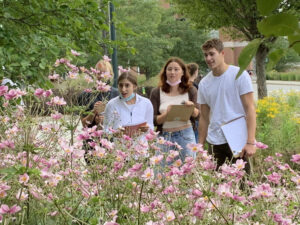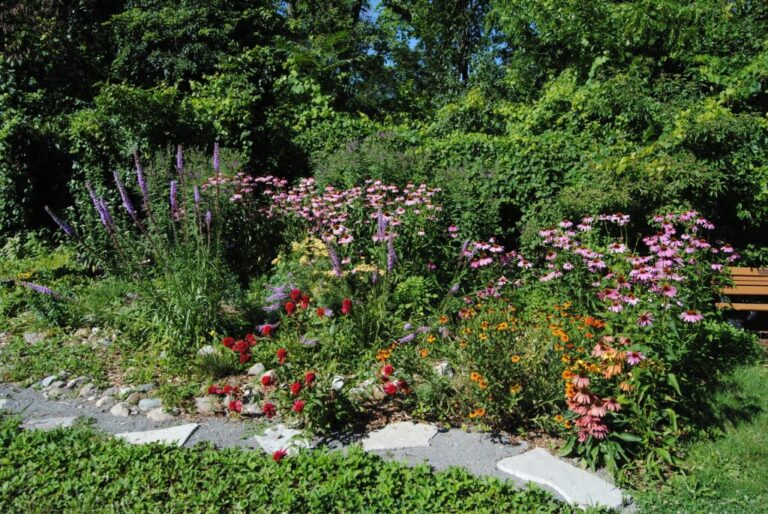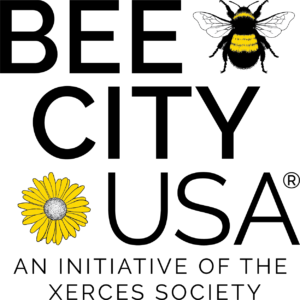Photo: Xerces Society / Sara Morris
Bee campus usa commitments

Thinking globally and acting locally, Bee Campus USA provides a framework for university and college campus communities to work together to conserve native pollinators by increasing the abundance of native plants, providing nest sites, and reducing the use of pesticides.
Bee Campus USA affiliates make commitments to conserve native pollinators. Students, faculty, administrators, and staff work together to carry out these commitments and make their campus a better place for pollinators.
Join the campuses across the country rallying to protect pollinators and bring your community together to create positive change!
Establish a standing Bee Campus USA committee to advocate for pollinators.
Committees generally include a mix of students, faculty, and staff. At least one member of the grounds or landscaping department must serve on the committee to facilitate communication between the committee and those involved in campus landscaping. The committee should have a chair or multiple co-chairs and meet on a regular schedule. To maintain continuity a student may not serve as the sole chair, however a student is welcome to serve as a co-chair along with a faculty or staff member.
Create and enhance pollinator habitat on campus by increasing the abundance of native plants and providing nest sites.
Create or enhance pollinator habitat on campus each year. To assist with habitat creation and provide guidance for the campus, affiliates create a native plant list and native plant supplier list. There’s no need to create these materials before applying, but they should be complete by your first renewal. Guidance and examples will be provided to assist in developing each of these resources.
Reduce the use of pesticides.
Create and adopt an integrated pest management (IPM) plan designed to prevent pest problems, reduce pesticide use, and expand the use of non-chemical pest management methods. Like the native plant list and native plant supplier list, the IPM plan should be developed over the first few years of affiliation.
Offer courses or continuing education opportunities that incorporate pollinator conservation.
Incorporate information about native pollinators and pollinator conservation into courses or continuing education opportunities.
Offer service-learning projects to enhance pollinator habitat.
Offer service-learning projects related to enhancing pollinator habitat each year.
Display signage focused on pollinator conservation.
Display signage focused on pollinator conservation. These signs can either be permanent (such as educational signage near pollinator-friendly habitat) or temporary signage (including flyers in cafeterias, etc.). Xerces provides affiliates with artwork for a street sign along with custom logos that they are welcome to have printed as signs and display on campus.
Maintain an online presence for your Bee Campus USA activities.
Maintain an online presence where your committee can share information about activities as well as your native plant list, native plant supplier list, and integrated pest management plan. This could be a page on the university or college’s website or a separate site. Many affiliates also use social media to share information about their activities.
Pay an initial application fee and annual renewal fee.
To sustain the Bee City USA and Bee Campus USA program affiliates pay an application fee and annual renewal fees. These fees are based on student enrollment. Visit the application page to learn more about fees. Renewal fees are the same amount as the application fee.
Annually apply for renewal and report on the previous year’s activities.
Submit a renewal application once you have been affiliated with Bee Campus USA for a full calendar year. Renewals allow Xerces to monitor affiliate activities and share the great work they’re doing.
Xerces staff are available to support affiliates and provide resources to help them complete these commitments.
AASHE STARS Grounds Certification Exemplary Practice Credit
The Bee Campus USA affiliation earns two Grounds Certification exemplary practice credit points in the Association for the Advancement of Sustainability in Higher Education (AASHE)’s Sustainability Tracking, Assessment & Rating System™ (STARS) system. The STARS system is a transparent, self-reporting framework for colleges and universities to measure their sustainability performance.

A flower bed at University of Michigan-Dearborn’s Pollinator Garden: “Volunteers have been involved from the outset in the establishment and maintenance of the gardens. Frequent garden action days have involved students, staff, and the public in planting, weeding, and invasive species removal.” Read their Bee Campus USA Affiliate Spotlight. Credit: University of Michigan-Dearborn.




